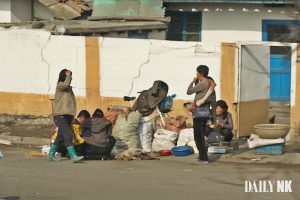Commodity prices in some of North Korea’s markets have been falling recently, Daily NK has learned. A source told Daily NK that there are an increasing number of business people at markets who are trying to quickly sell off their goods because of rumors that the authorities are intervening with price controls.
The source, who is based in North Hamgyong Province, told Daily NK that rice at the Sunam Market in Chongjin was selling for KPW 4,500 a kilogram until falling to KPW 4,050 as of Mar. 18, while corn had fallen from KPW 2,800 to KPW 2,300.
The source also reported that cooking oil, which had been selling for KPW 32,500, is now just KPW 28,000. Even sugar, which was selling for KPW 48,000, is now selling for just KPW 45,000.
There have also been items whose prices have fallen by half. Soybeans have gone from selling at KPW 8,000 to just KPW 4,800, while sailfin sandfish has gone from KPW 2,000 to KPW 1,150. Grilled atka mackerel, meanwhile, has gone from KPW 4,000 to just KPW 2,450.
The source told Daily NK that there are rumors that the authorities are “readjusting the upper limits of [commodity] prices.”

Specifically, the source reported that people are saying they are hearing that the government plans to set prices “in the near future” and that the prices are “much lower than what [the commodities] are currently selling for.” People are also saying that if business people sell goods at prices higher than the state-set ones, the authorities will “confiscate their goods.”
According to the source, the rumor began circulating the area from around Mar. 10, and in Chongjin commodity prices began falling from Mar. 11. “Scared business people are selling off their goods at cheaper prices before [the government] begins [its intervention],” he added.
According to Article 86 of North Korea’s Socialist Commerce Act, business people are not allowed to sell prohibited goods at markets or sell their wares at prices that exceed state-set upper limits on prices. Essentially, the act provides the foundations for the authorities to adjust market prices “appropriately” when needed.
The fall in purchasing power among North Koreans due to economic troubles brought about by the COVID-19 pandemic also appears to have impacted the drop in prices.
“There is hardly anyone left who is eating three meals a day,” the source said, adding, “I hear a lot of people saying they are enduring this [economic] crisis by reducing the amount of food they eat.”

















